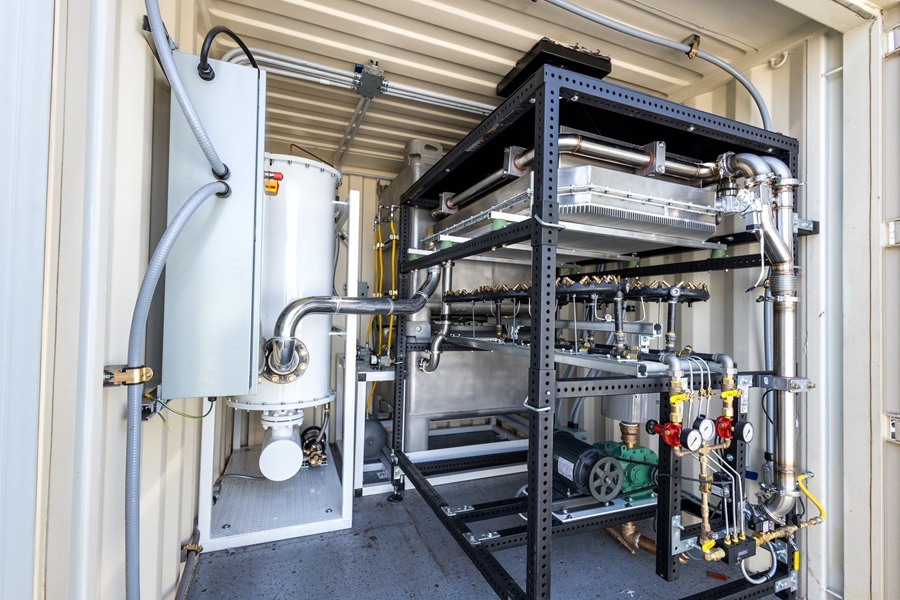
Oregon-based Espiku, in collaboration with Halliburton Labs, aims to help drillers reuse produced water and reduce disposal. The company is scouting potential pilot project sites in the Permian Basin, Bakken and North Texas. (Source: Espiku)
As the cost of water management associated with drilling for oil and gas rises, the race to provide solutions is gaining more entrants.
One of them is Espiku, based in Bend, Oregon, where founder Bahman Abbasi is an associate professor of energy systems engineering at Oregon State University.
The company is one of five energy startups selected in December to collaborate with Halliburton Labs. The Halliburton Co. subsidiary helps businesses scale up by providing access to facilities, networks and financing.
Espiku’s systems turn produced water into clean water for reuse, recovering some potentially useful minerals along the way.
“We are proposing a technology that starts with water—recycles, reuses, just keeping the water clean and creating value that way,” Abbasi said. “We drastically reduce the amount that needs to be disposed.”
Espiku plans a pilot project to begin in the next couple of months at one of four possible sites — two in the Permian Basin, one near Fort Worth and one in the Bakken.
Once placed, the unit will put produced water through a three-stage separation process:
- First is a simple density separation that removes most of the oil and heavy organic materials.
- Next is a dehumidification process “that is really the core of our technology,” Abbasi said. “It’s designed to get water out of the system without fouling up the whole place.”
- The final stage condenses water out of the gaseous stream.
The pilot’s goals are to show the system can run well with minimal human intervention, deliver the quality of water reached in lab tests and work financially.
The side streams will vary depending on location, but they will typically contain useful amounts of lithium, magnesium, cobalt and nickel. It wouldn’t make economic sense to drill for any of these in the Permian but they can be a profitable byproduct and help companies save on the cost of transportation, injection and storage, Abbasi said.
Water management “is on every operator’s radar screen,” Amanda Brock, CEO of Aris Water Solutions, said in November at Hart Energy’s DUG Executive Oil Conference & Expo. “This basin is producing just a tremendous amount of water, and it’s got to go somewhere. If you don’t have a place for the water to go, it impacts production.”
Abbasi said he expects a surge of technology to address the water problem thanks to legislative incentives in Texas, and he’s happy to be at the forefront.

Abbasi said a major advantage of Espiku’s system is the wide range of water it can handle. Produced water isn’t the same everywhere: The mineral compositions change from place to place.
“A lot of technologies struggle to work with this as they’re designed for certain salinity ranges,” Abbasi said. “We are completely agnostic of the amount of salts or the type of salts in the stream.”
Recommended Reading
South Bow Shuts Down Keystone Pipeline After Oil Release
2025-04-09 - South Bow Corp. reported a release of approximately 3,500 bbl near Fort Ransom, North Dakota, and it is evaluating the return-to-service plans.
Targa Buys Back Bakken Assets After Strong 2024
2025-02-20 - Targa Resources Corp. is repurchasing its interest in Targa Badlands LLC for $1.8 billion and announced three new projects to expand its NGL system during its fourth-quarter earnings call.
Canadian Province Gives Environmental Warning to Pipeline Project
2025-03-19 - The Prince Rupert Gas Transmission Project is a 497-mile project that would ship up to 3.6 Bcf/d of natural gas to an LNG facility on the Canadian west coast.
Brookfield Infrastructure Partners Buys Colonial Pipeline for $9B
2025-04-04 - Brookfield Infrastructure Partners LP has agreed to acquire Colonial Enterprises, the owner of the Colonial Pipeline, in a deal valued at $9 billion.
Intensity Infrastructure Partners Pitches Open Season for Bakken NatGas Egress
2025-02-04 - Analysts note the Bakken Shale’s need for more takeaway capacity as Intensity Infrastructure Partners launches an open season for a potential 126-mile natural gas transport line out of the basin.
Comments
Add new comment
This conversation is moderated according to Hart Energy community rules. Please read the rules before joining the discussion. If you’re experiencing any technical problems, please contact our customer care team.





